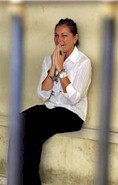The 'Third Party Fixer' Proposition
The proposition that the marijuana was placed in Schapelle Corby’s bag by a third party at Bali airport with unidentified sinister motives is not one which has been widely considered, but it is in fact extremely credible.
BACKGROUND & MOTIVES
The suggestion that someone placed the drugs for a motive other than direct financial benefit is sometimes dismissed because the alternative motives themselves are not immediately obvious. Upon consideration, however, it is clear that there are in fact a number of profoundly significant possibilities.
One example relates to politics. It is glaringly obvious that an Australian facing an Indonesian court on a charge of trafficking where the evidence amounts to nothing other than the dodgy insertion of a few kilograms of marijuana would generate significant political friction between the two nations. This in fact is precisely what transpired.
The wish for political friction, and deterioration of the relationship between Australia and Indonesia, would benefit the objectives of many parties, including those who seek confrontation between Muslim communities and the West (to whom that particular relationship is strategic). Indeed, it is clear that ultimately the Australian government sacrificed Schapelle Corby’s human rights to stabilize that relationship.
This is a high return serious motive, which would involve the sort of operator and budget which would make the placement of the drugs themselves a mere formality.
But there are a host of other possible motives too, including for example a hatred of Australian or western tourists by a single twisted individual. This possibility was recently articulated via an incoming email:
- When Indonesia invaded East Timor in the mid 70s after Portugal abandoned it, the Australian government looked the other way and said and did nothing. For a quarter of a century the Australian government claimed that it had no problem with the invasion and that it respected Indonesia’s territorial integrity – all for the sake of continued trade with our big aggressive northern neighbor. Unspeakable atrocities occurred over those long years and we did nothing.
Then around 1999, after Indonesia’s President Soeharto (Suharto) was ousted from power, Australia joined numerous other voices pressing the Indonesian government to allow the East Timorese to decide if they wanted to be a part of Indonesia or not. The Indonesians viewed Australia as a two-faced traitor. The vote was cast and the East Timorese voted “No!”
After the vote, hundreds of thousands of pro-Indonesian East Timorese civilians fled for their lives to West Timor and numerous other parts of Indonesia, including Bali (several thousand fled to Bali). They included farmers, business people, teachers and government employees of all kinds, and their families. East Timor was their paradise. Most of the tens of thousands of Indonesian troops based in East Timor were from the Udayana Military Command in Bali.
Are you getting the picture? Several thousand civilians and tens of thousands of military end up back in Bali, their lives completely in turmoil. And who do they see all around them living the good life? Australian tourists buying their sisters and daughters and Australian soldiers swilling beer on leave from their peace-keeping duties in East Timor. The potential for a seething hatred must have existed.
The years passed. How many ex-Timorese soldiers in Bali were reassigned to non-military functions such as the Bali police force? How many former Timorese civilians found jobs at Ngurah Rai Airport as baggage-handlers or security guards? And how many of those never really got over the indignity of their forced eviction from East Timor?
In my opinion, the potential for malicious acts, such as planting illicit drugs on innocent travelers, is definitely a possibility.
And there are many other potential scenarios like this too, such as the wish to cause embarrassment to Qantas Airlines or Sydney or Brisbane airports, or perhaps even the possibility of national hatred, as suggested by another correspondent:
- The timing of such malicious behaviour fitted the recent events. Throughout 2003 and 2004 there was much Australian coverage of Indonesian legal prosecution of the 2002 Bali bombers, and related matters. Much vitriol accompanied the first trial of the prominent scholar Abu Bakar Bashir. The prosecution case against him was not strong, but he was nonetheless convicted of minor charges, receiving a light sentence.
The precise philosophical affiliation of our unseen operator could be a number of things, but it enough for such a person to decide: So Australians are unhappy with the results of Indonesian justice? Let’s see how they like the results of this!
The proposition therefore is amply supported in terms of a wide and varied range of potential motivations.
THE DRUG PLACEMENT OPERATION
The mechanics of the operation are again well described via an incoming email from yet another party:
- The unseen operator had no interest in drug trafficking, or in the price of marijuana in Bali. Marijuana is suitable for its illegality, its conspicuous bulk in volume and its recognizability. The operator made his investment, perhaps in concert with the supplier, or perhaps by less conspicuous means. All he needed was access to luggage areas in the airport and the right moment to make the insertion.
The means are modest, the risk from airport security as is now obvious is low, and once done the operation is assured of some level of success. Even an early acquittal for the unlucky traveler would be worthwhile, because in the ensuing controversy judges could be accused of special leniency to Australians or worse, and all objectives are partly met.
Indonesian justice however is rigorous and strict, The burden of proof of innocence rests on the accused, and without sound evidence the case for the defense is difficult, if not impossible. The controversy is predictable. The unusual nature of the charge creates a widespread belief in Australia that the accused is innocent, while in Indonesia the association between Australians and drugs is all too plausible.
And:
- From there it just keeps getting better. The accused, horrified at her arresting officers describing her words and behavior as incriminating, calls them liars. Australians start behaving badly and Indonesian reaction is unsympathetic. Offensive remarks about Indonesian justice and Australian arrogance and criminality are made by parliamentarians in each country, and the eventual sentence is severe.
Corby has an unusually close connection to Bali. Her sister is married to a Balinese, and she has been there herself a number of times. Some have seen in this fact a greater likelihood of guilt, but if I throw a rock at a passing tourist bus, should it be a surprise if the passenger I hit is a frequent traveler on route to a familiar destination? Corby knows that taking her own boogie board is cumbersome but worth the effort. She’s done it before and it makes perfect sense. No need to worry about locked luggage, there’s no problem.
Meanwhile the unseen operator had to hit the right target. The right target was a young Australian on holidays, the sort of person who quite likely has some connection, directly or indirectly, with recreational drugs. The specific item chosen for insertion was a boogie board bag. Bulky recreational luggage is not the sort of thing a resident of Indonesia or elsewhere in Asia, or an international traveler. is likely to carry around,
For the first piece of physical evidence we have only Corby’s own evidence, and that of her traveling party. The one drawback with Corby’s boogie board bag is that while it has plenty of room, it was too light. The extra 4 kg might have been noticeable to the owner who may have discovered it before customs did. The unseen operator broke the carrying strap of the bag, so that the owner would not pick it up, but rather drag it or place it on a trolley, which is exactly what happened.
Corby testified that the strap was broken as evidence of John Ford’s improbable clumsy drug trafficker, She did not seem to understand that it was broken for a reason. The unseen operator was a luggage expert.
And finally:
- The unseen operator’s last problem was the customs service at Ngurah Rai airport, and it is here that there is sound evidence of his existence, because his one miscalculation was to underestimate the thoroughness and modernity of Indonesian customs.
Customs officer Igusti Ngurah Nyoman Winata testified that he first became aware of the suspicious nature of Corby’s luggage when he scanned incoming items through an x-ray machine, prior to passenger collection. In cross examination he stated he did not unzip the luggage, nor cut open the marijuana wrapping. Corby’s defense lawyers challenged this point because they wished to question Winata’s honesty in order to cast doubt on his account and because they wished to query the procedures relating to handling of evidence. Corby herself has expressed dismay at the casual manner in which her arresting officers handled the physical evidence, but that was after the arrest. In doing so they don’t seem to have taken seriously the possibility that Winata was telling the complete truth. Winata may or may not have unzipped the luggage to have a closer look, but he has no good reason to cut open the wrapping. Even if he did unzip the luggage, the transparency of the wrapping would have confirmed his suspicion. Direct examination of the marijuana could wait until after the arrest, as in fact took place. There was even ample opportunity for petty pilfering were Winata and his colleagues so inclined.
The unseen operator however had little faith in customs. His substantial investment is wasted if customs didn’t detect it, and he was anxious that the value he aimed for be achieved. Not even transparency was enough, so he added smell. A quick unzip by the most casual inspector would achieve the desired outcome.
The marijuana wrapping consisted of two vacuum sealed plastic bags, one inside the other. Even with rough handling the compressed contents were unlikely to burst both layers. There were no sharp objects in the boogie board bag.
If Winata did not cut open the wrapping, who did and why, if not our unseen operator? I am unable to offer any plausible alternative.
SELF PERPETUATUON
Clearly therefore this proposition is more than just tenable. There are sound rational arguments to support it, and plenty of supporting evidence for the explanation.
Once the fuse had been lit via the third party, the motives and self-interests described in the sections covering Proposition 1 and Proposition 2, drove events forward at pace.
Events in both Indonesia and Australia took on a life of their own, with tragic consequences for the innocent and bewildered Schapelle Corby.
Return to Main Propositions Page


